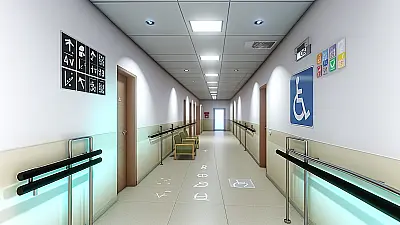MOORESVILLE, NC - A North Carolina nursing facility cancelled emergency medical services for a resident who suffered a suspected hip fracture during a fall, despite clinical signs indicating serious injury.

Critical Assessment and Treatment Failures
An inspection at Accordius Health At Mooresville revealed serious lapses in emergency medical response protocols following a resident fall on May 27, 2024. The incident involved Resident #40, who was discovered face down on the floor at approximately 10:40 PM after another resident alerted staff by yelling for help.
Multiple staff members, including three nurses and two nursing aides, responded to the scene. The team made several critical errors in their immediate response. Rather than conducting a comprehensive assessment before moving the resident, staff members physically lifted Resident #40 from the floor by placing their hands under his arms while a nursing aide maintained traction on his left leg.
Only after transferring the resident back to bed did Nurse #3 perform a proper assessment and obtain vital signs. During this examination, she observed that Resident #40's left leg appeared internally rotated and noticeably shorter than his right leg - classic indicators of a hip fracture that should have been evident before any attempt to move the patient.
Emergency Response Cancelled Despite Clinical Evidence
Following the assessment that revealed obvious signs of a potential fracture, Nurse #3 initially made the appropriate decision to summon Emergency Medical Services. However, after consulting with the Director of Nursing and reviewing the resident's chart, she was instructed to cancel the EMS response.
The facility's rationale centered on Resident #40's advance directive, which indicated "Do Not Hospitalize" unless comfort needs could not be met at the facility. This interpretation of the directive led to a delay in proper medical evaluation and treatment for what appeared to be a serious orthopedic injury.
An X-ray performed the following day on May 28, 2024, confirmed what the clinical signs had suggested - Resident #40 had sustained an acute fracture of the proximal left femur, commonly known as a hip fracture. Only then was the resident transferred to a hospital for appropriate evaluation and pain management.
Medical Standards and Proper Fall Response Protocols
Standard medical protocols require immediate comprehensive assessment before moving any fall victim, particularly elderly residents who face higher risks of fractures due to age-related bone density loss and increased fall vulnerability. Healthcare facilities should conduct thorough neurological and musculoskeletal evaluations while the patient remains in the position found, checking for signs of head injury, spinal trauma, or fractures.
The presence of leg rotation and length discrepancy represents textbook signs of hip fracture that warrant immediate medical intervention. These clinical indicators should trigger emergency protocols regardless of advance directive status, as pain management and proper immobilization constitute comfort care measures.
Hip fractures in elderly patients require prompt medical attention to prevent complications including severe pain, blood clots, pneumonia, and decreased mobility. Delayed treatment can lead to increased morbidity and compromised recovery outcomes, making immediate assessment and appropriate intervention critical for patient welfare.
Advance Directive Interpretation Issues
The facility's interpretation of the "Do Not Hospitalize" directive raises concerns about understanding appropriate applications of such documents. Advance directives typically aim to prevent unwanted aggressive treatments in terminal situations, not to avoid necessary comfort care or pain management interventions.
Medical professionals generally interpret these directives to allow hospital transfers when comfort needs cannot be adequately addressed in the current care setting. A suspected hip fracture with associated pain typically requires diagnostic imaging, orthopedic evaluation, and specialized pain management that exceeds most nursing facility capabilities.
Regulatory Violations and Safety Implications
The inspection identified this incident as representing "immediate jeopardy to resident health or safety" - the most serious category of nursing home violations. This classification indicates that the facility's actions or inactions created a situation where residents faced immediate risk of serious harm, injury, or death.
The deficient practice affected one of three residents reviewed for change of condition protocols, suggesting potential systemic issues in emergency response procedures. Such violations can result in significant penalties, increased oversight, and mandatory corrective action plans.
Additional Issues Identified
The inspection narrative focused specifically on the fall response and emergency care failures, indicating this represented the primary concern identified during the review of change of condition protocols.
The facility's handling of this incident highlights the critical importance of proper emergency response training, accurate advance directive interpretation, and prioritizing resident safety in clinical decision-making processes.
Full Inspection Report
The details above represent a summary of key findings. View the complete inspection report for Accordius Health At Mooresville from 2024-06-13 including all violations, facility responses, and corrective action plans.
💬 Join the Discussion
Comments are moderated. Please keep discussions respectful and relevant to nursing home care quality.